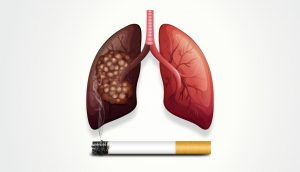Stop Smoking! Start Living!

Smoking is an addiction that continues to dominate several lives. Many a time a person thinks he would like to give it up, but is helpless and gives in to the craving out of sheer habit. He knows that he might become a victim of a chronic disease like chronic obstructive pulmonary disease or even worse, cancer.
Chronic Obstructive Pulmonary Disease (COPD) is the second leading cause of death and disability in India. The 2019 GBD report estimated the COPD prevalence to be 37.8 million in India. The true burden may be several-fold higher.
COPD is a progressive disease characterized by chronic breathlessness, cough, phlegm production and wheezing. It not only impacts our lungs adversely but has a deleterious effect on an individual’s general well-being and significantly impairs quality of life. However, it is preventable if risk factors are tackled, especially smoking.
Smoking could also result in lung cancer. Unfortunately, due to a lack of public awareness and screening programs in our country, a majority (50%) of the patients are diagnosed with lung cancer after it has spread to other parts of the body and hence many such patients don’t survive for more than a year. Lung cancer is becoming a major healthcare problem in India and it is predicted that there will be more than 1 lakh new lung cancer cases in the next 5 years in India.

Other health risks associated with smoking
A common link between COPD and lung cancer is tobacco consumption via smoking. Smoking has not only been implicated as the single most important risk factor for the above illnesses but has also been linked to a number of other non-communicable diseases like ischemic heart disease, stroke, peripheral vascular disease and other malignancies primarily in the head and neck region. Smoking also increases the risk of contracting infections like pneumonia and pulmonary tuberculosis. It also is responsible for the flaring of symptoms related to other diseases like Hypertension, Asthma, and acid reflux disease. Passive smokers are also exposed to several health issues both in children and adults. Children who are exposed to second-hand smoke are at increased risk of sudden infant death, respiratory infections, ear infections, more severe asthma and slowed lung growth.
In short, tobacco smoke is incredibly harmful and there is no safe way to smoke. Replacing cigarettes or beedis with other forms won’t help avoid health risks.

Prevention
There is an urgent need for preventive approaches to be put in place to prevent young people from taking up this heinous practice as well as strategies to help people to give up the habit.
Our government has brought several policies in place that ensure the prohibition of smoking in public places, ban of sale to children, prevention of smoking advertising, warning messages on cigarette and beedi packets and education of the youth through various means on the harmful effects of smoking. In addition, taxation laws are frequently revised and improved to curtail the sale of beedis and cigarettes. These measures discourage people from taking up smoking but getting those who smoke to stop is another herculean task.
We, at the Department of Pulmonary and Critical Care Medicine in Ramaiah Memorial Hospital, are extremely devoted to helping our patients give up smoking. Newly diagnosed COPD patients are counselled in-depth, and the adverse effects of smoking on their already damaged lungs and other organs are explained. Those who continue to smoke are motivated at every visit to give up the practice, behavioural therapy is offered and the help of dedicated deaddiction experts (Psychiatry) is sought.
Pharmacotherapy
Pharmacotherapy is offered to those who are motivated to prevent craving and nicotine withdrawal. There are drugs available which can reduce cravings and ensure sustained remission from smoking. In addition, nicotine can be replaced via chewing gums, lozenges and patches in those who are abstaining. In addition, caregivers are counseled to ensure continued motivation. People who have been smoking for years may have several relapses before successful abstinence is achieved. Hence family and caregiver support are crucial and it is imperative to prevent chastising those who relapse. We are also in the process to offer lung cancer screening to long-time smokers and COPD patients who may be harboring early undiagnosed lung cancers apart from emphasizing smoking cessation.
In the near future, we hope and will strive to see a tobacco-free India and reduce the healthcare and economic burden caused by tobacco smoking.
Bharath Chhabria MD DM
Assistant Professor and Consultant
Department of Pulmonary and Critical Care Medicine

